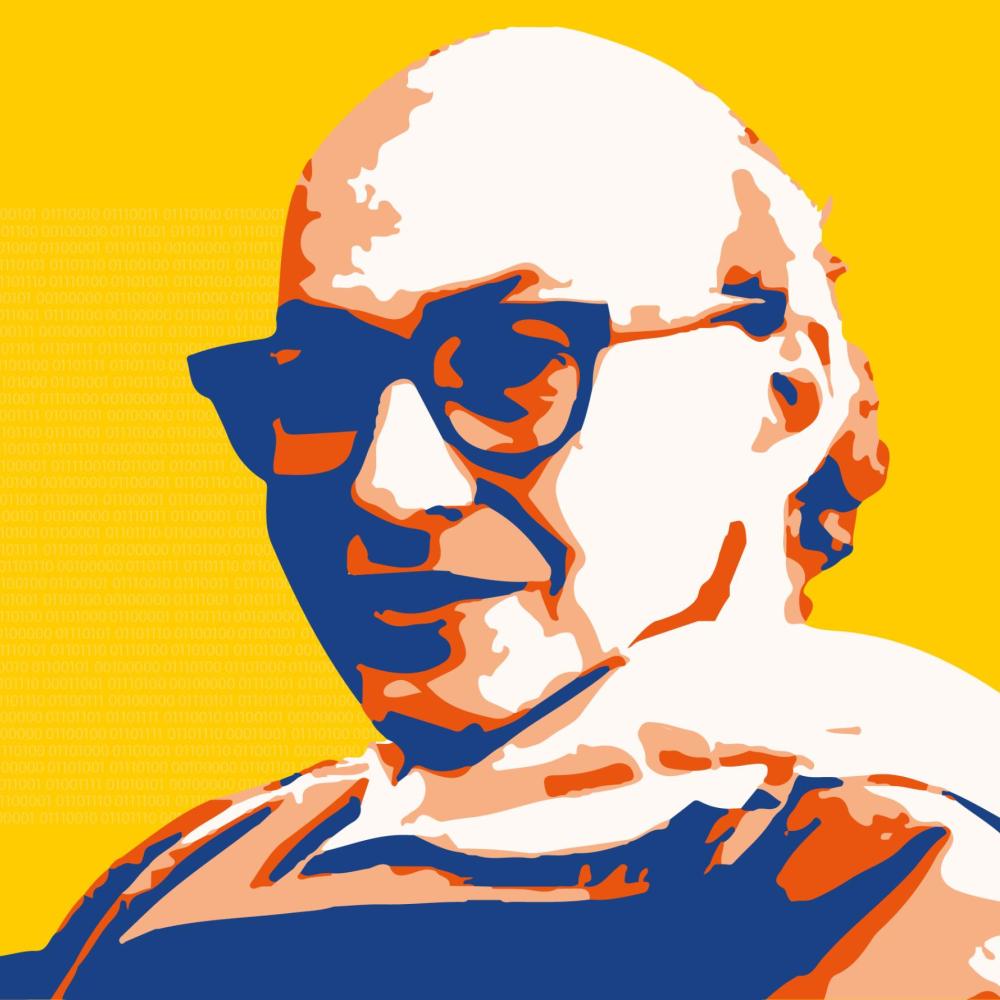

Marvin L. MINSKY (°1920 - 2016)
Profession: Scientist, inventor, and author
Nationality: American
Why an honorary doctorate?
In 1986, Marvin Minsky received an honorary doctorate from VUB for his contributions and achievements within his field of work and study.
Credit where credit is due
Minsky's lucid research into artificial intelligence and the consequences it has for people and humanity are of a staggering level.
Striving for progress and treading scientifically unknown paths feeds the hungry mouths of educational institutions and their disciples. It inspires, motivates, and opens the way to new insights.
Those who walk the same path over and over again do not discover new things. However, different angles of view give more light. They allow for comparison, different insights, provide confirmation or call for further research. Constraints prevent growth and a convinced understanding. Learning is a never ending story, for those who want to, in a world with countless roads.
"You don't understand anything until you learn it more than one way."
About his career
Developer of fascinating theories
He leads a research group with computer scientist John McCarthy in computer models that mimic human thinking.
AKA "Old Man Minsky"
Besides being a respected engineer, he was also a consultant for Stanley Kubrick's film '2001: a Space Odyssey'.
Pioneer in robotics and telepresence
He builds one of the first visual scanners and mechanical hands with tactile sensors.
Steps towards artificial intelligence
Marvin Minsky writes a few ground-breaking papers: 'Steps Towards Artificial Intelligence' (1961) and 'Matter, Mind and Models' (1963), on the creation of self-aware machines.
The art of the artificial
After Marvin Minsky figuratively pins his doctorate on his chest, he goes to work at the Massachusetts Institute of Technology (MIT) in Cambridge in 1958. It is one of the most prestigious technical universities in the world. Minsky is Toshiba Professor of Media Arts and Media Studies and Professor of Electrical Engineering and Computer Science.
Together with John McCarthy, a well-known computer scientist with a pronounced affinity for artificial intelligence, he is the centre of a research group working on computer models that mimic human thinking. Minsky develops fascinating theories; that intelligence can arise from the interaction of non-intelligence parts, such as computers communicating with each other within a network, for example.
Minsky's contributions include graphics and symbolic mathematical calculations, and he has made a contribution to advanced technologies for exploring space. An inventor with several patents to his name. He is a pioneer in robotics and telepresence, building one of the first visual scanners and mechanical hands with touch sensors.
Marvin Minsky writes some ground-breaking papers. ‘Steps towards artificial intelligence' from 1961 and 'Matter, mind and models' from 1963, about creating self-aware machines. Countless others follow.
It is the early 1970s. Minsky and Seymour Papert, the well-known mathematician and psychologist, formulate a theory called The Society Mind. They combine insights from child development psychology with their experience in artificial intelligence research. Their findings appear in the newspapers. Papert uses their ideas to transform education, while Minsky continues to refine the theory. A book 'The Society of Mind' follows in 1985 and a sequel in 2006: ‘The Emotion Machine'.
‘Old Man Minsky' receives numerous recognitions during his career, is a member of leading associations of top engineers and a consultant for the film '2001: A Space Odyssey' by Stanley Kubrick. During filming, he narrowly escapes death in an accident on the set.
Marvin Minsky is 88 - the calendar says 2016 - when a cerebral haemorrhage kills him. He is a member of the scientific advisory board of the Alcor Life Extension Foundation. This is an organisation that researches bringing people back to life after freezing. It is said that after his last breath, he was frozen as patient 144.
What is an honorary doctorate?
VUB has awarded honorary doctorates every year since 1978 to personalities from the most diverse backgrounds who have made a remarkable contribution to their field and to society. From this solemn moment of recognition, they bear the honorary title of Doctor Honoris Causa of VUB.